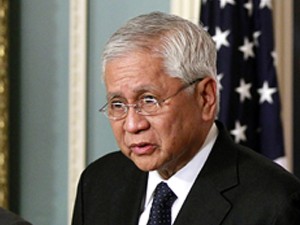
Foreign Secretary Albert del Rosario said Monday any joint development in disputed territories in the West Philippine Sea should abide by Philippine laws and any business talks should be led by the private sector. AP FILE PHOTO
The Philippines is taking with caution Chinese Ambassador Ma Keqing’s declaration of Beijing’s openness to a joint exploration for oil and gas in the West Philippine Sea (South China Sea), a position more recently reiterated by China’s foreign ministry to show its commitment to a peaceful resolution of the maritime dispute embroiling both countries.
Foreign Secretary Albert del Rosario said Monday any joint development in disputed territories in the West Philippine Sea should abide by Philippine laws and any business talks should be led by the private sector.
“We take a guarded position on China’s statement on joint development,” said Del Rosario in a text message to the Philippine Daily Inquirer.
“Any commercial negotiations on oil exploration should be left to the private sector parties concerned to undertake. Any exploration agreement in the West Philippine Sea must be in accordance with Philippine law,” the country’s top diplomat said.
In an interview with the Inquirer staff last month, Ma expressed China’s willingness to jointly explore oil and mineral riches in the West Philippine Sea, saying that “it is a still very valid formula” as border disputes may not be solved “in the very short term.”
Chinese Vice Foreign Minister Zhang Zhijun later said in a speech in Beijing that “joint development may still well be a practical approach” in resolving the maritime dispute, asserting that China was against the use of force to settle the issue.
Del Rosario declined to comment further when asked how the seeming openness of the Chinese would impact on the debate on sovereignty over islands in the contested areas.
The Philippines, China, Taiwan, Vietnam, Malaysia and Brunei have conflicting claims over territories in the West Philippine Sea which are believed to be rich in oil, mineral and marine resources.
The China National Offshore Oil Corp. (CNOOC) is known to have started deep-water drilling in parts of the South China Sea.
Taiwan’s Bureau of Mines and state-run oil supplier CPC Corp. have announced plans to begin oil and gas exploration in the waters around Ligao, the biggest island in the disputed Spratlys chain that the Taiwanese call Taiping.
The Philippines meanwhile has oil exploration contracts in parts of the Spratlys within its exclusive economic zone. These are with CNOOC and are held by Filipino businessmen Manuel V. Pangilinan and Ricky Razon through Forum Energy.
China’s statements asserting its commitment to a peaceful resolution to the maritime disputes come amid actions the Philippines has viewed as violations of international law, including the entry of Chinese patrol boats in the disputed waters and the holding of military drills and construction of new infrastructure on one large island.
China established Sansha City on the island as an extension of its southern province of Hainan last year to govern the whole of the Spratlys island chain. It is known to have some 1,000 civilians and 6,000 troops as permanent residents on Sansha.
The Philippines has brought the dispute to the United Nations but China refuses to recognize the world body’s authority, preferring, it has said, to deal bilaterally with the countries it is in conflict with.

